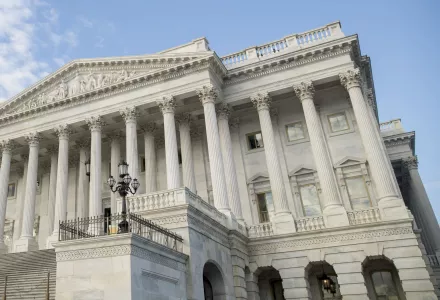
We live in an age of transformational technological innovation that many refer to as the “Fourth Industrial Revolution.” Like other revolutions, if we do not take care to direct it thoughtfully, this one runs the risk of overwhelming us. Technologies like artificial intelligence and synthetic biology hold great promise to make humanity more prosperous and healthier, but they also can potentially be used to cause great harm. The public good must be the moral center of this revolution.
As the epicenter of emerging technology research, the United States must lead the way, shaping new technologies in accordance with our values. This is a responsibility made more important by the rise of China as an economic competitor with a different set of values. Unfortunately, Congress, as well as some companies, have not shown that they are ready to reckon with the promise or peril of emerging technologies. In the infamous Facebook hearings, members of Congress were unfamiliar with even the most basic facets of social media—by now, no one’s idea of an emerging technology.
Without fundamental changes, can we really expect Congress to tackle society-shaping technologies like artificial intelligence, genome editing, and autonomous vehicles—to say nothing of the innovations yet to be invented? While it is easy to rag on Congress for its dysfunction, it is more useful to consider why Congress is unprepared and what can be done to bolster Congress’s capacity to deal with emerging technology issues.
For nearly a year, our team at the Technology and Public Purpose Project has investigated this question and what can be done about it. To understand the root causes of this problem, we spoke to dozens of people who have worked on Capitol Hill—former members of Congress, current and former staffers, and more. We also wanted to hear from experts who provide information to Congress: academics, think tank staffers, lobbyists, and staff at Congress’s legislative support agencies, like the Congressional Research Service and Government Accountability Office.
In those conversations it became clear that, despite being one of the most advised bodies in the world, there is a clear gap between what Congress could benefit from and the expert resources it has available to it. Members of Congress are used to voting on an astonishing variety of issues and absorbing as much relevant information as their jobs permit. As one congressional staffer put it, “there is no silver bullet—it’s a funding issue, it’s an expertise issue, it’s an institutional issue in terms of time and ability to focus on the issue.” Our analysis led us to four actions that we believe would improve Congress’s capacity to reckon with emerging technology issues.
First, Congress should establish a bipartisan and bicameral support body focused on offering nonpartisan technical advice to Congress. I am on the record arguing that the Office of Technology Assessment, one such body that was defunded in the 1990s, should be resurrected—something that Congress is actively considering. Additionally, a bipartisan group of senators and representatives just released the Office of Technology Assessment Improvement and Enhancement Act, which seeks to make the Office of Technology Assessment more responsive to members’ needs.
Second, Congress needs more scientists and technologists working on committees and in member offices. To get there, Congress should target both undergraduate students pursuing science degrees and mid-career professionals, creating pathways for each to work on Capitol Hill at levels commensurate with their experience. Universities, think tanks, and foundations can help Congress create these pathways and, separately, train scientists and technologists on how to be effective policy advisors.
Third, Congress must give itself the resources to hire enough people with the right skill sets. In the years since I was recruited to provide technical analysis for the Office of Technology Assessment, Congress has allowed its support agencies and committees to atrophy; members of Congress are forced to do more with less, and have trouble keeping up.
Fourth, as they are crafting reports and memos for Congress, scientists and technologists should think less like scientists and more like time-strapped policymakers by offering concise, action-oriented inputs. Above all, they should analyze all possible alternatives—members of Congress are the ones who should make decisions among the informed options.
To be sure, these solutions are not complicated—or even expensive. They also are not surprising; as with so many things, politics gets in the way of common-sense solutions. Members of Congress of both parties do not want to vote to increase their budgets, making it difficult to hire science and technology experts; they worry that an Office of Technology Assessment-like body will be unnecessary or, worse, immediately politicized.
Despite this polarization, many members of Congress—like those who serve on the House Select Committee on the Modernization of Congress—show that a bipartisan effort to improve Congress’s science and technology capacity is possible. Their committee recently unanimously recommended “reestablishing and restructuring an improved Office of Technology Assessment,” among dozens of additional changes. Bipartisan progress is possible.
The stakes are clear. Now is the time for a bipartisan and bicameral group of forward-thinking legislators to come together and build a 21st century Congress that is more capable of dealing with emerging technologies. It is time to get ahead of technology’s dilemmas while keeping its many benefits to society.
Carter, Ash. “How Congress Can Step Up on Innovative Technology Issues.” The Hill, September 26, 2019



